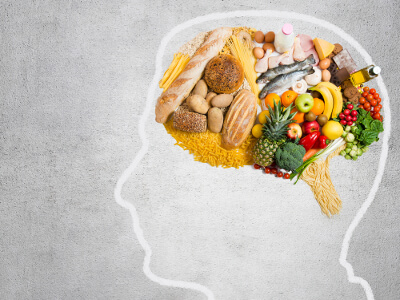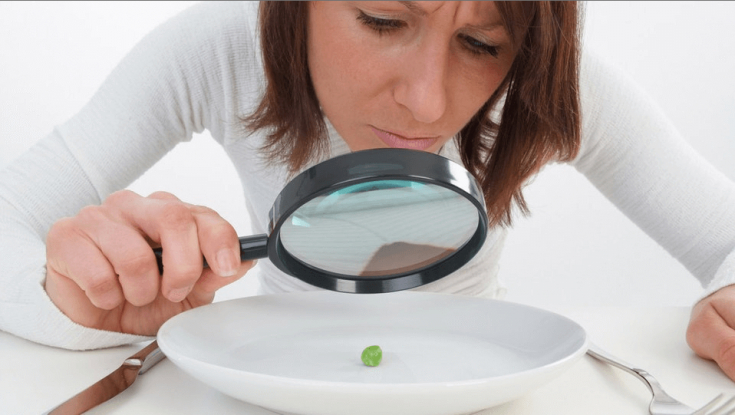Orthorexia Nervosa is an eating condition characterized by an obsession or fixation on "healthy eating". Although not formally recognized as an eating disorder, orthorexia shares many similarities with more common disorders such as anorexia. Society's focus on excellence, social media, and health helps reinforce this obsession in people with orthorexia. It is estimated that at least 30 million people in the US alone have an eating disorder.
The estet-portal.com editors offer 10 ways to find out if your healthy lifestyle has turned into orthorexia.
1. You are obsessed with "healthy eating"
Orthorexia usually starts "painlessly" and virtually unnoticeable, unlike other eating disorders, because your original intention is simply to eat healthy. But when healthy eating becomes an obsession, you go into a state of eating disorder. You may become obsessed and overly focused on the quality of your food, specific ingredients, or healthy trends. As the obsession progresses, it becomes the center of your world and begins to interfere with your personal, social and work life.
Follow our Facebook page! 2. Diet Fixation Controls Your Emotions
 When you become obsessed with your diet and eating habits, your emotions become dependent on that obsession. You may have certain "rules" or patterns in your food chain that control how you feel. If you suffer from orthorexia, you may feel emotional turmoil when your "rules" are set. violated but superficial happiness when your obsession has brought results. Over time, your emotions and your feelings may become dependent solely on your healthy food.
When you become obsessed with your diet and eating habits, your emotions become dependent on that obsession. You may have certain "rules" or patterns in your food chain that control how you feel. If you suffer from orthorexia, you may feel emotional turmoil when your "rules" are set. violated but superficial happiness when your obsession has brought results. Over time, your emotions and your feelings may become dependent solely on your healthy food.
3. You judge others by their eating habits
People with orthorexia may begin to judge family and friends based on eating habits and lifestyle. You can even restrict yourself from other people and different meetings so that you do not have to be around the "unclean" person. food or people who don't share your "rules".
Bulimia nervosa: excessive love of food or serious illness
4. You go to great lengths to achieve a "healthy" Lifestyle
Not only do you start to refuse food or practice certain dietary rules with orthorexia, you can go to great lengths to follow these guidelines that you yourself set. You may have irrational problems, associated with excessive preparation and cleaning of food, as well as methods of its preparation. You can also spend a lot of time planning, researching and cooking. The length used to achieve your healthy eating idea may alienate you from other aspects of your life.
 5. You avoid food prepared by others
5. You avoid food prepared by others
People with orthorexia need to feel absolute control over their diet. And if you're obsessed with ingredients, food, and how it's prepared, you may have a genuine fear of losing control of your diet. This may mean that you begin to refuse food prepared by others, or refuse to eat in a restaurant. ordinary laziness or disease
6. Certain foods and food groups are starting to be eliminated from your diet
In an effort to achieve the healthiest diet possible, you may choose not to eat food at all. Everything that you consider unworthy of your "healthy" lifestyle, may be excluded from your diet. You can become obsessed with checking labels and eliminating ingredients, food items, and food groups to fit your rule-based diet and lifestyle. The society we live in perpetuates orthorexic thinking by perpetuating fear-based thoughts about food.
7. Fear of getting sick
With orthorexia, you may feel obsessed with your diet and have an overwhelming fear of being "unhealthy." To gain control of the situation, people with orthorexia seek to control their health through their diets. You may develop orthorexia if you are obsessed with the fear of disease. eight. You are obsessed with social networks and live in a world of illusions 
The modern world provides you with many unrealistic expectations. Whether it's weight, looks or lifestyle, it's easy to compare yourself to millions of others. This may be especially true for the younger generation: more than half of teenage girls and almost 1/3 of teenage boys use unhealthy behaviors to control their weight. People with orthorexia become obsessed with these expectations put forward through social media and modern society. However, orthorexia is not defined by a person's desire to achieve a certain body type, but rather by achieving a certain "healthy" body type. lifestyle. You can also rely on these signs to perpetuate misinformation about healthy eating.
9. You experience a vicious cycle of feelingsWhen you have orthorexia, your diet obsession begins to control your emotions. But this creates an imbalance and a vicious cycle where you can experience mood swings; often switching between feelings of shame and self-hatred to feelings of euphoria, depending on how your "lifestyle" goes. The more depressed and anxious you are, the deeper you go into obsession in order to get more euphoric feelings.
10. The physical signs of malnutrition begin as a result of an unbalanced diet
The physical signs of orthorexia vary by person and situation. But over time, your obsession with food, restrictions, and routine will bring your body into a state of imbalance. You may begin to feel tired or weak. You can also lose weight dramatically and dramatically, feel cold, and take longer to recover from common illnesses and viruses.

Orthorexia – severe eating disorder
People with orthorexia have an unhealthy obsession with strict diets. Although it is always recommended to lead a healthy lifestyle, people with orthorexia become so obsessed with healthy eating that their physical and mental condition, as well as daily life, begins to suffer.
 Without proper care xxxx>orthorexia
Without proper care xxxx>orthorexia
can cause traumatic consequences for your mental and physical health, as well as control the happiness of your personal, work and social life. If you're experiencing any of these symptoms of orthorexia or think you might have an eating disorder, seek help from a professional you trust.
Watch us on YouTube:






Add a comment